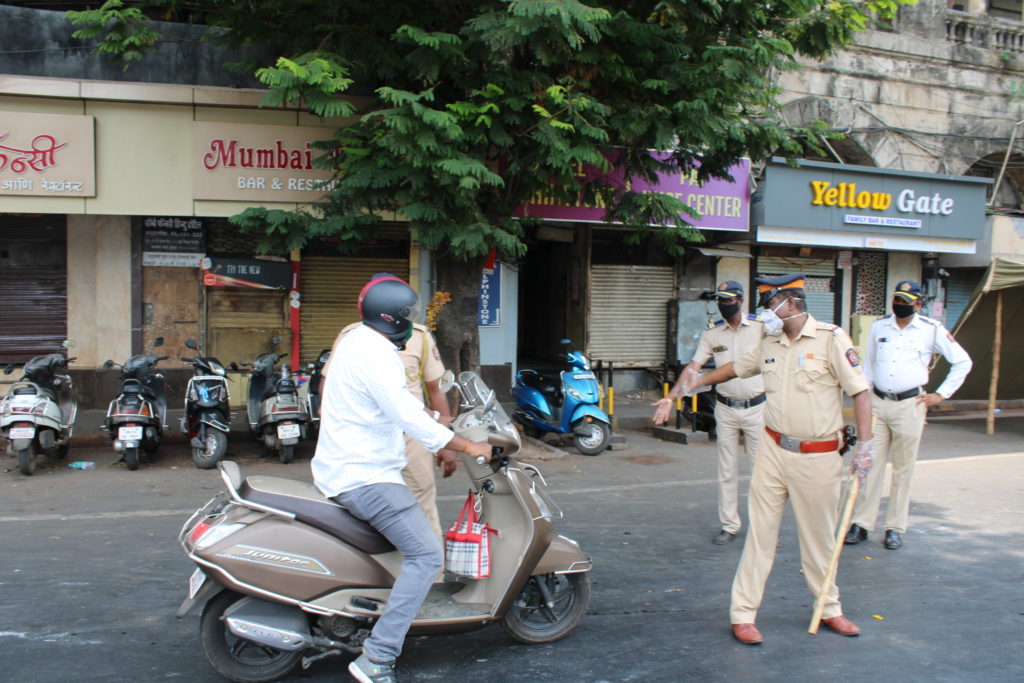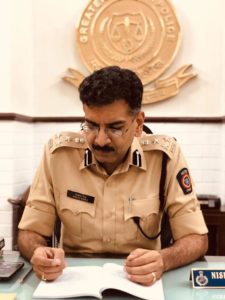‘Mumbai Police is at the forefront of the battle against Covid-19’
Facing an unprecedented situation, the women and men of Mumbai Police are trying to maintain a humane approach while dealing with lockdown from the front, says additional commissioner of police (south zone) Nishith Mishra.
With the unenviable task of enforcing the 21-day lockdown announced by the government, while keeping a humane approach, the Mumbai Police has stood out from several other police forces around the nation in the way it has handled the crisis.
‘‘This situation is unprecedented for us and everyone else. We know we have to enforce the lockdown, but we need to remember that this is not a typical curfew or a communal situation that we are dealing with. During a communal riot, every person out on the streets is a potential trouble maker, but during the lockdown most people are just out to get their groceries and other essential commodities,’’ says additional commissioner of police (south zone) Nishith Mishra, in an exclusive interview with Media India Group.
Contrary to the conventional wisdom, the police forces in India and indeed across the world are the ones who face maximum potential exposure to covid-19 patients, in the execution of their normal duties of patrolling and implementing the lockdown. ‘‘In terms of sheer exposure to the people, the police force is the one that is in the maximum contact zone. They interact with thousands of people everyday and we have given strict briefings to them about maintaining a safe distance from anyone and also to wear masks and if needed, protective gear, as a preventive measure,’’ says Mishra.

“Police officials have been asked to wear masks for two reasons. One is to prevent them from falling ill due to their interactions with potentially ill persons. The other reason is to ensure an infected police official does not contaminate his fellow officials,” says Mishra
There has been a whole lot of debate about the need or even the utility of masks as an effective defensive mechanism against the infection spreading. While there is a severe shortage of masks in the country, there is no clear communication by the health officials in India on whether everyone needs to wear a mask. The police officials have been told to wear one anyway. Mishra says that the police officials have been asked to wear masks for two reasons. One is to prevent them from falling ill due to their interactions with potentially ill persons. The other reason is to ensure an infected police official does not contaminate his fellow officials.
The police have also been actively involved in conveying to the people the urgent need for maintaining social distance to reduce the chances of catching the virus. Mishra says that the challenge for the police has been two-fold. One is to inform people and help them maintain social distancing. But before that, the police officials themselves need to understand and follow this amongst themselves. ‘‘It is very crucial for our force that everyone understands perfectly well the concept of social distancing. We are a force of over 55,000 persons and in each police station, at a given time, there are between 40-80 persons, confined in that small space. Hence, if they don’t follow the protocol, infections can spread rapidly,’’ he says.
Mishra says the police have had to walk a very thin line between enforcing the lockdown and yet ensure that there is no panic amongst the people. ‘‘At this time, the administration is obviously doing all it can to maintain the confidence of the populace and so far and from what I have seen on the field, it appears to have succeeded commendably,’’ he says.
One of the biggest positive side effects of the lockdown has been on crime. With a strict lockdown and several police checkpoints mounted across the city, Mumbai’s crime rates have dipped to unprecedented levels. Mishra says that in his zone, south Mumbai, covering a population of over 3 million and extending from Cuffe Parade at the southern tip of the island city to areas like Byculla and Pydhonie, the number of violent crimes, involving bodily harm, have come down by 75 pc since the lockdown commenced. ‘‘Crime has seen a tremendous dip. I have discussed with my seniors and even they are saying that Mumbai has never seen such crime free days. So, yes, the lockdown has actually helped,’’ he says.
Mishra says that his force is also sensitive to the needs of the most vulnerable sections of the society and that they are trying to assist them as well. ‘‘Apart from the fact that the police is there to enforce the lockdown as well as ensure continuous supply of essential commodities, we are also alive to the fact that Mumbai has a substantial population of migrant workers as well as homeless, the Mumbai police has established contact with numerous NGOs to ensure that these people are fed properly,’’ he says.










